Legal Updates and Open Q&A with Trent Cotney - PODCAST TRANSCRIPT
July 24, 2025 at 2:00 p.m.Editor's note: The following is the transcript of a live interview with Trent Cotney of Adams & Reese. You can read the interview below, listen to the podcast or watch the recording.
Intro: Good morning and welcome to Coffee Conversations. My name is Heidi Ellsworth and you are here with RoofersCoffeeShop and The Coffee Shops. This is an exciting Coffee Conversations today because we've got Trent Cotney one on one to answer your questions today to find out what's happening, what should I be doing, where are we? There is so much going on that we are all trying to kind of stay in tune and no one stays up to date and understands more of what's going on than Trent. Yes.
So a few housekeeping. First of all, we are recording and this is being recorded and it will be available within 24 to 48 hours. So please share it out with your friends, your family, roofing professionals, contractors across the board, because this is the kind of information that really helps your business. Also, the chat is open and the chat's open every time we're on a Coffee Conversation, but today is extra special.
We have a few questions we'll start out with, but we want to hear from you, what are your questions, what are your top issues? What are you looking for help on? And so get into that chat right away. Tell us who you are, where you're from, what kind of business you have and we'll get going.
We're going to start with a big thank you to Adams & Reese for sponsoring this Coffee Conversation and really continually bringing Trent out into our industries to help us maneuver all the craziness that's going on out there right now. So Trent, thank you so much for being here today.
Trent Cotney: Hey, it's my pleasure. I'm looking forward to this.
Heidi Ellsworth: This is going to be fun.
Trent Cotney: Yeah.
Heidi Ellsworth: This is going to be really fun. So let's start up for those few people who may not know you with an introduction and tell us a little bit about Adams & Reese.
Trent Cotney: Sure. So I'm Trent Cotney. I'm a partner construction team leader, Adams & Reese. They're national law firm, about 20 offices, 100 lawyers or so. And within our construction department we have about 80 lawyers. I serve the roofing industry. I serve as general counsel for NRCA, variety of other trade associations. I've been very active in the industry for almost 30 years now. And live and breathe it. Basically what we're going to do in the next hour is what I do every single hour of my working existence. So I answer questions for contractors, I try to help contractors and other industry professionals and roofing. And the key thing, Heidi and you know this, I love the industry, I love advocating for the industry and this is a great opportunity for me to help the people that are here and hopefully answer some good questions. So again, looking forward to it.
Heidi Ellsworth: That sounds great. Well, let's get started. Let's get started. We're going to take the PowerPoint down. We're going to just have a great conversation. This is the power hour, so please ask your questions, but let's start with basically Trent, what are the top legal issues? What are the top issues that you are hearing every day from contractors across the country? And tell us a little bit about that.
Trent Cotney: Yeah. So I always joke around that nobody ever calls me with good news. And I don't ever get that call saying, "Hey, let me tell you how much money I made today." It's always the bad stuff, what's going on, the issues that are keeping contractors up at night. And that's great for me because it helps me understand what the real issues are. I don't have to rely on the news or social media. I understand from the contractors that call or email me or send me text messages, whatever, what the current concerns are.
And I would tell you by far the number one by leaps and bounds is immigration, whether it's ICE raids I-9 compliance, dealing with subs, understanding the variety of different issues that come up there. The other issues, I would say tariffs and how to deal with that, the uncertainty in market volatility, collections. We've had an uptick and collection actions from roofing contractors. Everything from understanding how to collect lien claims and bond claims. OSHA is still very, very active. Even under the Trump administration, there are about 24 federal states and 26 state plans and we get a ton of calls about OSHA and then employment related issues. Everything from wage and hour to non-competes to you name it. So it's never a dull moment and constantly getting new questions, new things that keep the wheels turning.
Heidi Ellsworth: Yeah, we were just at NRCA mid-year meetings last week together and really I heard talk about all these topics, but really the biggest one was immigration. NRCA just sent out that you put together as general counsel what to do, how to do it. Talk a little bit about what you're hearing. Let's dive a little bit deeper into immigration and some of the things that you're helping contractors prepare themselves, to help the folks who are in their companies and help their business keep going.
Trent Cotney: Yeah, absolutely. And I'm enjoying the chat here. I see a lot of friendly faces-
Heidi Ellsworth: Yeah, me too.
Trent Cotney: So, great to have you guys on here. The thing that I think is probably the most important right now because there's the most potential liability is how to handle an ICE raid. And many contractors just don't understand what they should be doing and what they should not be doing. So what I want to do is kind of convey some high points there and that is the key thing is stay calm, make sure that you've got a game plan in place. So Heidi you know from our past conversations, I'm a big believer in having a standard operating procedure for everything. You should have an internal operating procedure for if ICE shows up to either a project site or your home office, you should know exactly what to do and how to go about doing it. So you don't want to panic. You want to remain professional and composed, but make sure and assert your rights.
So for example, you don't have to talk to ICE, right? You have the right to remain silent. You got the right to ask for counsel and that's something that you should absolutely do. You should have a designated response team. So that would usually include HR, legal counsel and a member or to of management. When ICE shows up, regardless of whether it's at a job site or it's at a home office, typically they are coming with a warrant and there are two types of warrants, right? There's an administrative warrant or a judicial warrant, okay? An administrative warrant is a warrant that allows ICE to detain individuals that are on public property. So public property can be a sidewalk or it could be anywhere that is accessible by the public. So if I come to your home office and I can access your lobby, that's public area, which means if there are individuals there that I want to detain, I can detain them based on that warrant.
A judicial warrant is a warrant that is actually signed by a judge and it allows them to access private property. So I want everybody to pay attention to this part, because this is important. If for some reason ICE shows up to your job site or your home office, you need to look at the warrant, okay? You need to first determine is this an administrator or a judicial warrant? Is it signed by Department of Homeland Security or signed by a judge? The next thing you need to determine is what does it say? Does it have the right address on there? If it doesn't, you should object because it's not the right address, right? Don't interfere. Just object. If it is a judicial warrant, who are they asking to detain? What documents have they requested? Take a photo of the warrant and make sure that you document any documents or other things that have been removed and what's been done.
Now, the one thing that I want to hit home to everybody is it's very important that you assert your rights, but never, ever, ever, ever interfere with ICE. Everything I'm telling you is real world. This isn't just me coming up with scary hypothetical stuff. If ICE shows up to your home office and requests to access the warehouse area that is behind a locked door that says restricted access, signage is very important. So restricted access, private property, construction work site, all that kind of stuff, signals that it's private property that requires a judicial warrant. So ICE shows up, they show up in your lobby, which is technically a public area because anybody can get in there and they say, I've got this warrant and I want to go and find these people and detain them. You look at the warrant, the warrant is not judicial, so it does not allow them to access your warehouse area. They proceed to go ahead and go into that area despite the restricted access signs and everything else, what should you do? Don't block them, don't touch them, don't interfere with them, but object and make sure that you've got a witness there to hear your objection.
What I always recommend for any contractor is don't take the burden yourself, blame it on your lawyer. So I've looked at your warrant. What my lawyer has said is that this is not a judicial warrant, this is not give you the capability to go into this restricted access area. Therefore, I am objecting because I believe this is an improper search and seizure. Okay? So that's the home office analogy.
I want to turn now to project sites and we've had reports of this, Heidi, this is everywhere from it doesn't matter whether it's red state or blue State. We've had it in Florida, Texas. I've had Chicago, St. Louis, Northeast, California, Washington oregon, you name it, it's everywhere, right? It's everywhere. So if, I keep saying OSHA, if ICE shows up to a job site, let's go through the analysis there, right? Clearly the roof is a private area because it's got restricted access. Only certain people can gain access to that, right? But let's say you roll up on a house. Is a house private property or public property? Well, I'll give you a lawyer answer, it depends. So if anybody from the public can walk up to a door and ring the doorbell, then maybe there's some public access there. How do you protect yourself? Even if you're doing residential work, signage is important, right? There are a ton of those associated builder and contractor signs that say, this is a project site restricted access only. It'd be great to have one of those hung up or next to a truck or somewhere where you can point and say, "Hey, this is a private access only." And it's important to have that anyway for liability purposes, so why not have that?
But we had a situation where ICE rolled up on a job site, did not have a judicial warrant. The project manager said exactly what I just said, "Hey, respect you, not trying to interfere. But our lawyer has said, you can't access this job site because it's private." They said, "Fine." They waited on the side of the road and waited for the individuals to leave and then grabbed them once they're on the public road. So this is a very serious, real thing. Recognize that if you knowingly hire someone or retain someone that you know is illegal, you could be facing criminal liability, criminal liability. And again, everything I'm telling you is based on real-world experience. So I want to make sure that and assert your rights.
At the same pouring, I know I've been talking for a while, but I want to get this through. That's what to do if you're an employer and there's a lot more, I'm giving you 35,000 foot view. You also want to help your employees. So there are employee rights cards that you can provide that basically say, look, you don't have to talk to ICE. You have the right to request an attorney. You can provide attorney resources. So typically the attorney that an employer would hire for immigration purposes is not who an employee would hire. So I like to provide two or three names of immigration lawyers that handle employee type things and say, "Hey, here are some resources." You need to be careful because you can't assume someone's immigration status if you understand what I'm saying, right?
You need to offer that to all of your employees. Here's some resources, feel free to use them, take them, whatever, but don't signal people out because you could be facing discrimination based on national origin. So the key thing is if I had to summarize, remain calm, make sure you've got a game plan in place. Take copious notes and understand what the warrant details, notify counsel immediately, immediately because it is a pressure situation and you need to move quickly to mitigate anything that's going on. So that's a lot and I know we'll probably unpack it, but those are some of the high points with regard to immigration on ICE raids.
Heidi Ellsworth: Yeah, that's huge. If you have any questions, any thoughts, please type them into the chat or the QA. Megan and I are monitoring that and we'll get them out there. But one of the things, Trent, that I've been hearing, talking to contractors across the country and actually talking to very a large... Actually, lady who helps provide labor to staffing and stuff like that, is that basically they're starting to say, carry your documents with you, make sure you have all of your documents on you. Legal, well, obviously legal. So if you're legal, because of some of these things that are happening and you need to show documentation right then, right there if you don't want to be detained. Have you been hearing some of that?
Trent Cotney: Yeah, there is. When they engage in these roundups and I've heard different mechanisms how these roundups have occurred, some are because they're targeting a specific individual, so this individual may have criminal record or whatever reason they're targeting that person. Then they go in and they round up everybody. I've had other reports where a crew member is pulled over for DUI or a bar fight or whatever and as the local state law enforcement works with ICE, finds out that the person is illegal and then leans on that person to identify anybody that's working with him or her that is also illegal and then uses that as a basis to obtain a warrant to go and round up everybody. So it is possible that even if you are legal, you could potentially be dragged into something. And I think it is a good idea to have your documentation with you, especially in this environment.
It is with the One Big Beautiful Bill passing, the amount of money that is being allocated to border control and immigration is going to increase. So this is not going to go away. This is not something that you are only going to see for the first six months. It's going to continue to happen. And I am optimistic that with this sort of zero tolerance policy and immigration, that at some point there is going to be a legal mechanism down the road to allow workers to come in and work. I think they're going to have to do that because otherwise agriculture, hospitality and construction are going to take a big hit. So we'll see. But as of right now, I would recommend that just because you don't want to inadvertently get dragged into something and then have to prove after the fact that you were legal.
Heidi Ellsworth: [inaudible 00:16:27] point, one of the things that we did hear last week from the NRCA D.C. office who does all of our lobbying, is that immigration is their number one issue after that Big Bill passed. Now, there's a lot of movement within D.C. to do something on immigration, so hopefully we'll see something for a good legal thing. But we have a great question here and it's from Tara. "With the current climate in mind, when using subcontractors, is it our responsibility to vet their workers?"
Trent Cotney: So the answer is, that's a broad question, so let me break it down. When you're onboarding a sub, regardless of whether it's traditional subcontractor or a sublabor, you should have a subcontractor checklist. And that subcontractor checklist should include everything from requesting a copy of the master subcontract agreement to obtaining not just a COI, but their insurance policies for workers' comp and CGL, whatever other things that you need before they start. You are not allowed to ask for I-9s from a 1099. If you do, you could risk potential discrimination. You can require, for example, in your master subcontract agreement that they comply with all state and federal rules and regulations including compliance with immigration laws, okay? You can require that and I encourage having a provision like that in your subcontract, but you cannot and should not ask for I-9s from your sublabor.
Recognize that on certain projects, federal projects, for example, you may be subject to the Davis-Bacon Act, which is a federal act that requires certified payrolls, that has some heightened requirements as far as getting information and documentation from your subs. I'm not referring to that. I'm referring to traditional sublabor subcontractors on private roofing projects. The answer to that is no.
But let me give you another caveat, okay? One of the big issues that we faced last year, it's still an issue this year, even under the Trump administration, is what's known as misclassification. So if you have a subcontractor that only works for you, that doesn't work for anybody else, that wears your gear, that doesn't have a website, that doesn't market, that doesn't advertise, they're really your employees, you just aren't paying them correctly. So what that means is all the government agencies, the Department of Labor, who cares about wage and hour, they care about overtime and record keeping and minimum wage. OSHA, who is going to cite you for your subs bad acts and IRS who really likes payroll tax, right? They're all going to be looking at you.
So along with that, immigration entities, Department of Homeland Security and other similar agencies can say What you're doing here, I get it, there are 1099, so you're trying to wash your hands of compliance, but there may be a misclassification issue here. That takes a couple of jumps and I am aware of at least one instance where they've worked with other federal agencies to kind of do that. For those of you that are in Minnesota, for example, they have state agency compliance where all state agencies work together to determine misclassification, scary thing. So there are potential exposures, but to answer your question, to kind of just put a pin in it, do not ask for I-9s from your subs because technically they're 1099s, but do require that they comply with immigration requirements and OSHA requirements in your subcontractor agreement.
Heidi Ellsworth: And by having that in the subcontractor agreement, they're basically protecting themselves if something does happen.
Trent Cotney: It is. It's a good thing to have. Is it a get out of jail free card? Absolutely not. Because I can write the most beautiful contract provisions in the world. I can pull out and write them in calligraphy like the monks of old. But the problem is that operationally, if you're doing something completely different than what's in that contract, contract's garbage. So I have tons of self-serving statements in all my contracts. Sub is an independent contractor. They will handle their own payroll, they will handle their own withholding, they will do all stuff, great provision. But in reality, if they're not acting like a sub, if they're acting like an employee, that only gets you so far. Still want to have it, because if you don't have it, you don't even get past that first step, right?
Heidi Ellsworth: Right.
Trent Cotney: But recognize that there's nothing bulletproof about having that in a contract provision.
Heidi Ellsworth: I want to point out, because I know we have a lot of people on here, a lot of contractors, but we also have a lot of other businesses on here too. And Trent, this is something we went through with The Coffee Shops is making sure our 1099S were in line. Our I-9s were in line the whole nine yards. I mean this really applies to everyone to make sure that you're there.
Trent Cotney: Yeah. Manufacture. We've had, I'm aware of at least two reports of manufacturer plant raids. So you're not immune, right? You're not immune regardless of where you are or what you're doing. And compliance is key. Nobody likes it. It's not fun. It's not cool to think about, but you should be doing that. Along those lines, I talk about ICE raids. I talk a little bit about I-9 audits. We're seeing a big uptick in what's known as NOIs, notices of inspection. And what those are is that you'll receive it from either DHS or ICE or sometimes DOJ and you'll have three business days to turn over all your I-9s. I-9s are critical. You've got to make sure that they're filled out correctly. And if they're not filled out correctly, you have the opportunity to potentially change them, revise them so that they are correct prior to an NOI.
Obviously do that with the advice of counsel. We recommend initialing it. Never whiting out or backdating or falsifying and then usually I attaching a memo that describes why the change was made. But I recommend that everybody engage in an I-9 audit at least once a year just to verify that you're doing everything that you're supposed to be doing and you don't want to be in a situation where you're having to run around and panic because you don't have those documents ready. So that's another thing to kind of think about. Maintain your I-9s, even if you're in an E-Verify state, you still have to maintain I-9s.
Heidi Ellsworth: I have another great question here. It's from Laurie. Thank you, Laurie. It says, "Is there a statute of limitations on charging employers and their employees if they made a mistake on the audit?"
Trent Cotney: Statute of limitations for charging employee? And I'm not sure I entirely understand. Are you talking about back charging an employee for a mistake?
Heidi Ellsworth: Audits in the past.
Trent Cotney: Yeah, so I guess, let me answer this in a couple of different ways. First is big believer that if you're going to punish somebody for any reason, you need a policy or procedure to back that up. So it doesn't matter whether it's safety through your safety manual or it's an employee through an employee manual. So you should have within your employee manual, very specific information about documents that need to be filled out. If the person that's in charge of I-9 compliance your HR person, they should have their own policies and procedures onboarding checklist. You need a W-4, copy of a driver's license. You need whatever it is that you need in order to get somebody into payroll. And as part of that is I-9 compliance. So the key is that you want to routinely kind of go through and check that if you have an employee that has missed something or hasn't done something correctly, you can go back and ask for clarifying information. You need to be careful about what you say because you don't want to accuse anybody of being illegal or anything like that.
Classic example is Social Security mismatch. You might receive a mismatch letter saying, this isn't a real Social Security number. You can ask for additional documentation or something proving that, but if absent that capability, then you're in a position where you've got someone that you need to terminate. Once employment ends, employers have to retain that form I-9 for the longer of one of two periods, either three years from the date of hire or one year from the date the employee's employment ended, whichever is longer. So typically you want to make sure that you got a record retention program and that you are purging documents as needed. You don't want to expose. You don't have I-9 for people that left 20 years ago, right? You're just exposing yourself to potential liability. So recognize that that is something that this is something that you want to make sure that your HR person is doing on a regular basis.
Heidi Ellsworth: Laurie, if that didn't answer your question, let us go ahead and type in some more if that, but all good stuff. Okay, Lorna. Good morning, Lorna saying, "can roofing companies offer alternative work pathways such as H-2B or any other sponsorship program to their employees facing any situation with ICE?"
Trent Cotney: Yeah. Yes and no. So we have worked with contractors in the past on H-2B. It is not a fun process. And you guys know me, I'm a straight shooter. So H-2B is very limited and it's very laborious. It requires a lot of forethought and you've got to be able to apply well in advance and in a lot of ways it's difficult, but it is still an avenue. There are also other, we've put together employer sponsorships and assistance programs where you can potentially obtain access to visas or work with lawyers to obtain visas and that's something employers can help offer. The problem is that if you're in a situation where someone is illegal and they're still being employed by you, then you've got a real issue.
I'll give you an example. We had a contractor recently that he verified about a dozen new hires and of that five or six ended up not being legal. And the issue with that is that person told me it's like, look, this is a great crew. I need this crew. I can't afford not to have this crew. What do I do? And I tell them, well, legally all I can tell you is if you keep this crew, then you're knowingly retaining employees that you know are illegal and that you face both civil fines and criminal liability. Here's the risk, right? And it puts contractors in a very difficult position. So you're almost in a sort of don't ask don't tell type mentality. What's interesting is he verifies, not flawless can, all that is checking is to make sure that a Social Security number or other identification matches the name of an individual. So we've had plenty of situations where there's the equivalent of identity theft where somebody's name is put forward with a correct Social Security number, everything passes E-Verify, but the person turns out to be illegal.
So none of this is foolproof, aren't foolproof. E-Verify is not foolproof, but the goal is compliance. So if there's something that an investigator would look at and say, Hey, this is obvious, this is not an I-9 that's been filled out correctly, then that's an issue. So you want to do your best to try to comply.
Heidi Ellsworth: Yeah. And I think what we heard, again from the D.C. office is they are putting together programs. They're working in bipartisanship to put together some more pathways for immigrants to come in and legally get in. And so Trent, the Dignity Act, some of these others, can you talk a little bit to them? And what-
Trent Cotney: Yeah, this is something that every year that I've and Heidi, you could probably attest to this, I don't know how many years Roofing Day's been around. For those of you that don't know, Roofing Day is a day in D.C. where we all go to D.C. It's usually in April or March and we head up there and we usually talk about two or three issues. Every single time I've done it for the last six or seven years, immigration has been on there
Heidi Ellsworth: Always. Yeah.
Trent Cotney: And part of what we're seeing now is has kind of come to a head. And the reason is exactly what I said before is you can't have this zero-tolerance policy where you're deporting thousands of people a day and not have some legal mechanism for people to get in here because the jobs aren't going to be taken over by domestic labor. We need the foreign labor in order to be able to support what we're doing. Not just in construction, but in agriculture, hospitality, everywhere. And there has to be a mechanism to allow that. And I think you started to see some of the lobbyist groups for both agriculture and hospitality squawking and there was some comment made about the administration that they weren't going to look at businesses, but that went away quickly and they've been raiding farms and everything else as we saw in California here recently.
So I am optimistic that the amount of pressure that's being put on immigration now, that there's got to be something that happens because there's too many industries that are dependent upon foreign labor in order to continue doing what they're doing. So we may have the impetus necessary. It's always been this political quagmire that nobody wants to touch. I think now that the bipartisan efforts that I've seen, I'm optimistic that within the next year or so, if this level of immigration enforcement continues, they have to do something right? Otherwise, none of us are going to have jobs. So figure something else to do.
Heidi Ellsworth: Or roofs. Yeah, it's crazy. Sammy has a question here. "If my employee's H-2A visa is about to expire, but their spouse is approved for H-2A visa, can they go into H-4 writing out the visa of their spouse and then returning to their own to extend their employment ability?" That's a big question.
Trent Cotney: Yeah. So I will tell you. So let me talk about it this way. There are a variety of different visas out there and one of the things that employers need to understand is they have to have enough knowledge to understand when the expiration periods are for these various work authorizations. And understanding this can be a moving target. For example, they removed some of the status for Venezuelan, Haitians and Cubans. And you may have previously just verified their work authorization a month before that came down in June or whenever it came down and they may now be illegal based on that change of status.
So the H-4 visa is typically for dependent family members. H-2A, I've seen that primarily in agriculture. So that is a high level question. My initial thought, again, I'm a construction lawyer by trade. My initial thought is you may have some issues there, but I'd want to do a little bit of a deeper dive to see whether or not that's an option. I will tell you that where we've had issues like this, regardless of whether, we've had H-1 visas for C-suite, we've had H-2, both A and B and we've dealt with some H-4s. But the issue is that this administration is so difficult, not just on the enforcement side, but also on the application side. It is just a morass. So I would not pin your hopes on it. Is it a possibility? Maybe, but we'd have to do a much deeper dive to figure out whether or not that would work.
Heidi Ellsworth: Good questions, everybody. Thank you so much. Keep them coming. We want to have the questions come through. Let's switch a little bit over to tariffs. You mentioned that earlier and we just had this week, I think Japan and some other tariffs supposedly get negotiated. What should people be looking at for tariffs and what are you seeing there, Trent?
Trent Cotney: Yeah, again, moving target, right? Tariffs, the use of tariffs by this administration has done primarily for purposes of negotiating, right? So you're seeing a lot of whether it's to increase trade that's going one way or another way or it's to affect change regardless of what needs to be done. As you mentioned recently, Japan and several other Asian countries entered into an agreement with the United States to reduce, they were at 25%, they're now at roughly 15%. There's some exceptions carve-outs there and also some additional investment. I believe Japan's doing another like 550 million in investment in the U.S., all of which is fairly good news, but it does create uncertainty within construction.
Have I seen any real-world impacts on construction? Definitely in steel and coil, right? That has remained. It was, I believe 25%, but I believe that even doubled for anything outside the U.S. And part of that has to do... The political justification for that is Trump administration is looking to support the U.S. steel industry. And there was a large U.S. steel transaction that just occurred with Nippon Steel and Japan and they're looking to protect the U.S. steel industry and the labor unions related to that. So there's been a big, big push there. Obviously Pennsylvania is a battleground state, so you can anticipate why that's a big issue. So that I have seen a direct impact on, especially structural steel. Definitely gone up. What can contractors do to protect themselves? Well, regardless of whether it's a real issue or just a political talking point, always recommend that you have a price acceleration provision in your contract. And what that says is basically that in the event that any material line item goes up by 5% or more, that you're entitled to an equitable adjustment of the contract.
That you have to actually show the cost. You can't hide the ball and say, "Hey, my price on shingles just went up 10%. You got to pay me." You got to actually be able to show it. But that does give you a contractual mechanism to adjust your contract in the event anything happens. And I've used that same provision, I've developed my version of it back in 2004. I've used it through the material crisis, through COVID, through hurricanes and fires and whatever and it's worked. It's been traditionally challenged and I know it works. So as a side note, if anybody wants this, happy to provide it to you. I can either get it to you, Heidi or you can contact me directly and I'll send it to you for free, but recommend that you have that in there.
The other thing I would recommend Heidi, is know your supply chain. And what I mean by that is oftentimes, regardless of whether you're purchasing direct from manufacturer through distribution, you tend to only focus on your salesperson, go up the stream, know your credit manager, know other people that work for distribution and talk to them, talk to them about what they're hearing. Oftentimes they will give you a heads-up so that you can pre-purchase, right? You can order materials that may go up and store them for inventory purposes. Make sure that you have good inventory management software so that you understand how much of something you're ordering in a given day, week, month and tracking the prices of those things, so you can make strategic purchases in advance of potential issues that come down the road. Where we stand right now, I don't know what's going to happen tomorrow. I don't know, there could be 1,000% increase tariff on TPO. If that happens, then are you prepared? I think it's a two prong approach. One, contractually prepare yourself. And two, know your supply chain and monitor your inventory so that you're taking into account stuff that you can't source domestically and stuff that may be more volatile.
Heidi Ellsworth: Yeah, obviously through MetalCoffeeShop. We talked to a lot of the metal manufacturers, the metal suppliers. And I think having those contract provisions are important because it's not going to just be price increases from material coming in from out of country. It's also because the supply and demand, the demand for Made in USA products is becoming higher. Those prices are also increasing. And I've talked to several different manufacturers about that. They're just like, it's just a supply and demand issue. People want U.S. made steel and the prices are going up. So getting that into your contracts is really important. And we did say here, we wanted to get the price provision language. So you know what, Trent? We'll get that onto your directory. So Trent has a directory online and we'll have that on there today, Laurie or you can email us to Heidi@RoofersCoffeeShop.com and we'll make sure we get that directly to you.
So one question that we had here that just came in that I want to make sure we get to and this was from Lorna. And Lorna, I hope I'm going to read this right, but it says, "ICE is explaining in Spanish to employees..." Okay, Lorna, I might need help on this question. I think you went to Spanish in the first sentence. I'm not very good with Spanish if not. ICE is explaining all their rights in Spanish. I'm guessing that's it, that employees facing this issue. If not, what are the legal implications for filling on this matter? I think we're going to need a little bit more clarification on that. [inaudible 00:39:45].
Trent Cotney: Yeah, I think I understand what you're saying.
Heidi Ellsworth: Okay, great.
Trent Cotney: And this applies regardless of what government agency is. So if you're a government agency, you have to be able to communicate whatever the issues are in a language that that person understands. So classic example is if I'm OSHA, I come out to a job site and I'm interviewing a crew member that only speaks Spanish. I have to provide them with a Spanish speaker to provide with a translator that can understand and be able to accurately translate whatever information is being provided. So ICE in turn also has, if they are detaining, they have to Convey certain information, they should be conveying that information in Spanish or whatever language that person speaks. There may be some rights violations in the event that that is not conveyed. Typically, there's a series of statements that are read. And ICE always, they go in packs. So usually it's not just one person. So I haven't heard too much of this, but it doesn't surprise me that there may be some issues with getting that information.
Heidi Ellsworth: Great question, Lorna. Thank you so much. I do want to kind of hit on regulatory also because we do... The news cycle is the biggest thing, but then there's all these things that are happening on a regulatory issue, major legal. I know you follow cases. What are some of the things that are not hitting the news but really are important that roofing contractors understand?
Trent Cotney: Yeah, so I got the latest and greatest for you, Heidi.
Heidi Ellsworth: Okay, I know you do.
Trent Cotney: July 14th, just a few weeks ago, OSHA announced a new penalty structure. Okay? They're going to look at small businesses and they define small businesses as 25 and employees or less. They can a penalty reduction of 70%, that's 7-0. Previously this was only reserved for businesses that had 10 or fewer employees. So they've increased that. OSHA is also providing a penalty reduction if you immediately correct an A beta hazard, that can be 15% penalty reduction. And lastly, they're including a 20% reduction for those employees that haven't been cited before. So my recommendation is that if you are cited by OSHA, make sure that you engage in immediate abatement, take photos, documents, send that in because it could potentially help you reduce that fine.
Now, one thing I would say is oftentimes most contractors focus only on the money as it relates to OSHA. Focus on the penalty, not the money, the penalty. For example, if you get cited for a fall protection violation, you're doing that every single day of your working existence, you need to try to either eliminate or re-characterize those citations that are most dangerous to you because you don't want to be an annuity to OSHA, meaning they don't want to come out every six months and then start hitting you for repeats. And right now, the maximum repeat is I think up to 166,000. So you want to be very careful about. But this is good news, right?
We've heard that the Trump administration, obviously funding for Department of Labor is decreasing. The rank and file still remain pretty much the same. There have been a variety of OSHA offices that have closed as a result of DOGE cuts, but there's still enforcement. I do anticipate that with the last Trump administration, that we're not going to have as many high dollar fines and not as many willful violations, but still an issue.
And recognize that regardless of what Trump does on the federal level, if you're in California, if you're in Oregon, if you're in Washington, if you have a state plan, it's business as usual. So states can always be more restrictive than the federal government. So just because this exists on the federal level, don't assume that you're going to get a break if you're in one of those state plans.
Some other things to kind of keep your eye on the Department of Labor, I mentioned misclassification, that's a big issue. Under the Biden administration, they had a six factor test. It was an economic realities test that looked at six different factors to determine the independence of a 1099, regardless of whether they were a salesperson or a subcontractor. And what they would do is they would look at all these things, they throw them in a pot and look at what's known as the totality of the circumstances, which is legal BS for we're going to make a ball or strike call on this based on what we think is the right answer, right?
It is a very difficult for a contractor to show that they have legitimate subs, right? It makes it very difficult to show that. We're still governed by the Biden administration rule, but the Trump administration says that as far as enforcement, they're rolling it back to the previous Trump rule, which still had very similar criteria, it just wasn't applied the same way. So this is a very gray area. It is not a black or white area where you can say, if I do these three things, then I know I'm good because there's always some mechanism or some way that you can potentially either show that you're more an employee or that you should be more at 1099.
So last thing I'll mention as far as regulatory and this isn't as much regulatory, but I think it is a big issue and that's the One Big Beautiful Bill as it's called. A lot of different-
Heidi Ellsworth: [inaudible 00:45:24].
Trent Cotney: Say what?
Heidi Ellsworth: I was going to bring that up next. You reading my mind?
Trent Cotney: Okay. Yeah. So this is a big deal for contractors and I'm still digesting. I mean it's a thousand pages, but there's a lot of really great tax stuff here. And I encourage contractors get with your CPAs, because I'm taking note of it. So high points for those that are interested. Eliminates taxes on tips and over time. I'm a business owner. I own businesses, sold businesses. One of the worst things about being a business owner is payroll. And I didn't realize how bad it sucked until I became a business owner. And not having to pay on overtime is a good thing. So recognize that's a benefit. There's a deduction for American-made car loans and trucks where these are personal, not fleet, but you could potentially deduct interest associated with car loans. So think about that.
Additional SALT deduction. So what is SALT? SALT deductions, if you're in a state that has state income tax, you can potentially have a deduction on your federal income tax and that cap was raised to 40,000. So there are certain states that don't have income tax, Florida, but if you're in a state that does recognize that you may have that benefit.
Heidi Ellsworth: Oregon.
Trent Cotney: So other things, Section 199A pass through for businesses that was made permanent. That's big if you have an S-corp. And here's something that I thought was really cool Heidi and I'm sure you kind of appreciated this as well. Workforce development, you can now use section 529, college savings plans, what were college savings plans or Pell grants for either short-term training, vocational training, credentialing, basically workforce training. So I really was happy to hear this because I think more and more people are realizing that college isn't necessarily what it's cracked up to be. I think there's a lot of opportunities out there for that want to get in the trades and it was good to see this as a step forward. So a lot of other things in there, but definitely some positive notes for contractors.
Heidi Ellsworth: For the main street taxes, for the S-Corps, does that rate, did that stay the same or somewhere?
Trent Cotney: Yes. It did. 20%.
Heidi Ellsworth: 20%?
Trent Cotney: So Section 199A deduction is 20% for pass-throughs, which is now made permanent. And that's a good thing. There's also some additional bonus depreciation that was restored. So if you're expensing things like let's say... One of the things that I think is a downside for construction was section 179, which oftentimes would allow owners or developers to depreciate capital investments like commercial roofs. That's going to phase out in 2026. So it increases, I think in the short term from 2.5 to 4 million, but ultimately that benefit decreases. And a lot of the Inflation Reduction Act tax benefits that you would get from doing solar and things like that are gone. So there's some trade-offs there, but from a tax standpoint, I think it's probably going to be a better tax year for a lot of business owners
Heidi Ellsworth: For contractors out there. And first of all, Deb, thank you, Deb from NRCA, from our D.C. office, who does so much work for us, is getting some comments in there too. And about it remaining 20%, that's awesome. But one of the questions for contractors is with some of this, the deductions off the roof, the 179 still in place, should that be a major talking point and marketing to their business owners right now to take advantage of that sooner, because it's going to go away. Do they have time?
Trent Cotney: Yeah. And kudos, for those of you that don't know Deb and the great team over at NRCA, they are the lobbying arm for NRCA and they're miracle workers. So kudos to Deb, Dwayne, Terry. They just do a fantastic job. I bow to them because they are clearly at the forefront. I don't know how I deal with all this stuff. I can't keep with it. They're on the front line. But to answer your question, typically if you're a commercial roofing contractor, you have this in your slide deck, right? You're going to have a slide about section 1 79 or other tax benefits, whether they're state or local or federal. So I definitely think you should push it. And just because this is a constant bouncing ball, so there's always going to be opportunities out there. You just have to know how to pitch and what to pitch in the short term. Absolutely. I continue to pitch it because I think it's a great benefit for anybody that's out there potentially looking for new commercial roofs. But yeah, it's definitely something you want in your marketing materials.
Heidi Ellsworth: You just said, be careful on 179 and 179d changes as you see tax plan. So just for those, as you're kind of revamping that pitch, you're slide deck, be sure you can get a lot of this information on the nrca.net site. You can also, if you have specific questions, we can connect you with Trent or with Deb to find out. But like Trent said, talk to your own tax CPA. That's kind of the most important to make sure that we're all on the same page going there. So Trent, we only have, this is so much fun, by the way. I love this power hour. We have about nine minutes left. What are some of the things that looking economy-wise, there's just a lot of people talking about all different things. You mentioned collections, you're seeing some issues there. What are some of the things that contractors should be thinking about going into Q3 or in Q3 for Q3 and Q4 and looking at 2026? What are some of your top advice to just top of mind?
Trent Cotney: Yeah, we're in a transformative state right now. There's just a significant amount of changes that it makes it difficult for contractors to navigate. And there's this tendency to, if you're watching the news constantly, you're going to hide under a rock. So my advice to everyone is fundamentals. It doesn't matter what's going on out in the world. If you're purposeful and consistent in everything that you do, you're going to be successful. So I would make sure that you are doing your best to mitigate risk. I've always been a big believer in being proactive rather than reactive. I think that starts with making sure that you've got your core set of administrative backfill and that's your contracts, your manuals, your policies, your procedures. You want to make sure that if you lose a key person, that you can onboard someone and they know exactly what to do, right? There's a script in place. You don't want to be guessing, looking for things.
Monitor your AR, accounts receivable. Incredibly important to monitor. I believe that you should create a flow chart where you engage both email drips, drip campaign along with proactive calling, always retain a lawyer as a last measure. And that's a weird thing for a lawyer to say. But the goal is to internally exhaust everything you can to get paid and then work with a lawyer to in a phase by phase approach. So litigation should always be a last opportunity. You should start off with demand letters, lien rights, bond claims saying, look, your warranty is void unless I get paid. I understand you got these issues. I'm happy to throw in a free maintenance plan or throw in some walk paths, whatever we need to. Let's just get this done. Figure out ways to put bad deals behind you.
And then the other thing I would say is I always remember what my dad told me. My dad always referred to me as boy or son. He said, boy, "It's the customers that you don't take that make you successful." And I had no idea what he meant until I started my own business and then I knew exactly what he meant. And the goal of that is that contractors rely on their salespeople, on their estimators to say, "Hey, this is great. You need to take this job." Vet your customers. Vet your customers before you go out there. If I knew that a customer loves to sue contractors and does nothing but leave bad reviews, would I do that person's roof? No. So why isn't your person internally looking at the official records to see what judgments are out there, the case records to see if the person's in foreclosure and doing a quick search to see what kind of reviews this person leaves, right? There's no issue with that. It's all public record. You can easily find it.
Take time to vet your customers. If you're doing GC work, same thing. We all know the general contractors that stiff subs, why are you doing work for them? Right? There's no reason to do that kind of work. So those are just some tips. But again, fundamentals, fundamentals, fundamentals.
Heidi Ellsworth: Trent, can you repeat what your dad said? We had a request for you. Repeat that piece of advice.
Trent Cotney: Yeah. He said, "Is the customers that you don't take that make you successful." And all it takes is a couple of bad customers that aren't paying you and you can't make payroll, right?
Heidi Ellsworth: Yeah.
Trent Cotney: So it is vet your customers, understand who you are going to do business with. Don't just rely on your salespeople to say, "Hey, I got to winner here." Right? Look into them. Make sure that that avoid the landmines.
Heidi Ellsworth: One of the things I'm going to say too for looking at this and I think when we look back, every year has a word, right? 2020 is COVID. It seems like we have words for the years for 2025. For me, it has just, the word that has stood out all year is uncertainty. A lot of people feel like there's a lot of uncertainty out there. Some of it's self-inflicted, some of it's not. But I would recommend to get involved with your associations. The associations are on the front line, whether it's the state, local, obviously national and Trent, you are general counsel for, I can't even mention how many associations. But you work with them to help bring a lot of these issues up front, how important it is for everyone to kind of get involved.
Trent Cotney: Yeah, absolutely. Associations are critical. And I know we've got a few executive directors on here. I saw Troy Wormley on here, does a great job over at the Chicago Roofing Contractors Association. I love being part of associations, right? I can't do my job if I don't participate in associations, because I can't understand what the issues are, right? I can't sit here in my ivory tower and just be a lawyer. I've got to be out on the road. I've got to be understanding what the issues are. And the associations act as a funnel. They are the focal point for any action that needs to be done. So I was talking about Deb and the great job that NRCA does with the lobbying team. That's not all they do. I mean, they're on the front lines of technical safety, everything. And it's not just them, it's the regionals, right? It's the state associations. They are absolutely essential for making sure that our voice is heard. So I have met lifelong friends from my connections with this. I probably have more friends in roofing than I do out of roofing at this point.
So I encourage anybody that's listening, if you're not part of an association, get involved. It's just a tremendous... It's a great way to give back. And it's just a really powerful thing to have that sort of one voice as you approach industry issues.
Heidi Ellsworth: [inaudible 00:57:34]. Because I think that's where you can find all this information. You can get ahold of Trent. Of course, you can find Trent on RoofersCoffeeShop in his directory and in Adams & Reese's directory. But also Trent is our influencer, so he has another. You can find him all across the way. So getting involved. Thank you all for being here and thank you for sharing all of this. I want to say thank you as a sponsor to Adams & Reese and I really want to say Trent, again, some of my favorite times are these conversations with you. Thank you so much.
Trent Cotney: Yeah, it's my pleasure. Thank you everybody for the questions and hopefully I'll see you on the road
Outro: And we'll see you on the road. And speaking of associations and amazing trade shows, our next Coffee Conversations is August 7th and it's going to be about METALCON. If you have not been to METALCON, I'm telling you, it is a premier show and with what is happening in market share of metal and metal roofing, metal siding, metal buildings, erectors, everything, it is a must see. So we will be talking about why to go to METALCON, what's there and why it's more than just a trade show. So please join us on August 7th for that great Coffee Conversations. And again, please check out all of our directories. All this information is on RoofersCoffeeShop, along with all the past Coffee Conversations. If you've missed one, go back and watch it because they're pretty good. Thank you so much, everyone. Have a great day and we'll be seeing you in a couple of weeks.
Recommended For You
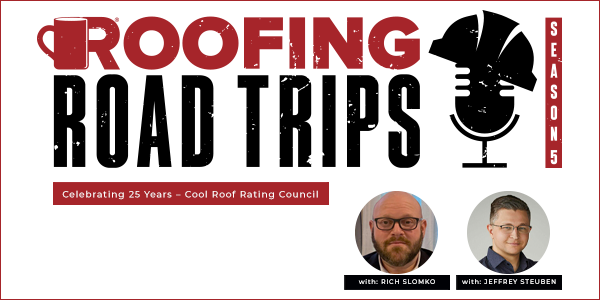
Rich Slomko & Jeffrey Steuben - Celebrating 25 Years of the Cool Roof Rating Council - PODCAST TRANSCRIPTION
Read More ...
Engineering, Education and Expansion - PODCAST TRANSCRIPT
Read More ...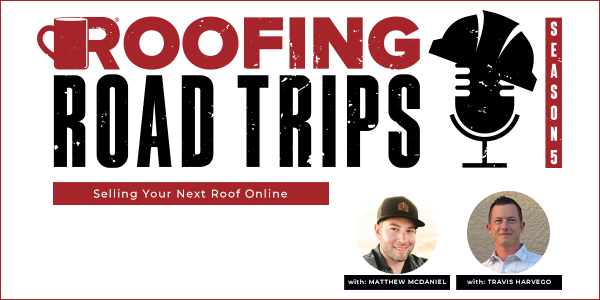
Matthew McDaniel and Travis Harvego - Selling Your Next Roof Online - PODCAST TRANSCRIPTION
Read More ...

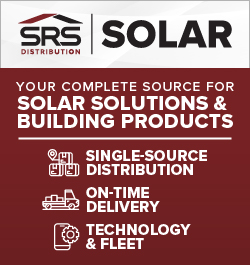

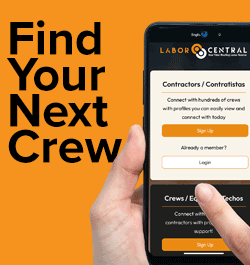




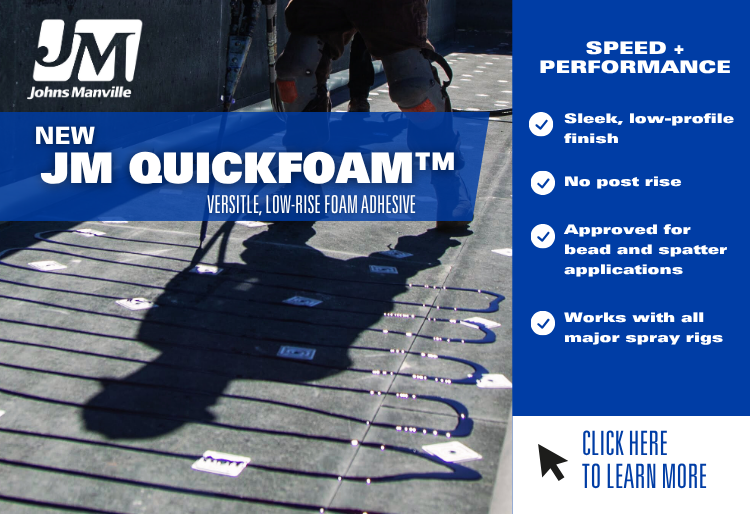





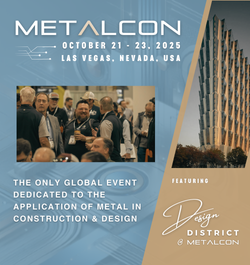
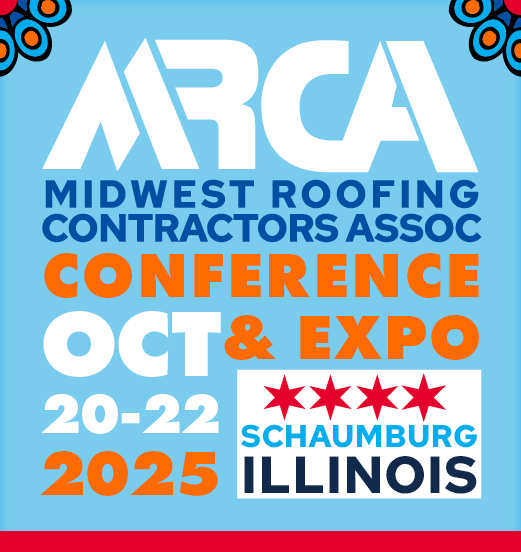



Comments
Leave a Reply
Have an account? Login to leave a comment!
Sign In